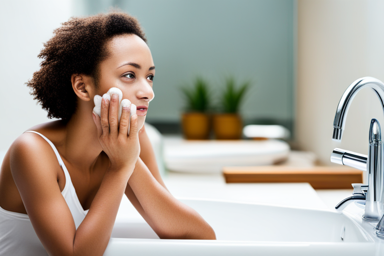Minding Beauty
Have you embraced the notion that mind-body beauty is something worth wrapping your brain around? The body of science is growing and validating the importance of brain health, emotional wellbeing, and resilience to inflammatory stress as the foundation of radiant skin and positive aging.
So what does this mean in practical terms? Notwithstanding the complex medical practice of psycho-dermatology, mind-body beauty is at the heart of uber-relevant trends in neurocosmetics and can be achieved by habit-stacking simple bio-hacks that manifest as a clear, radiant, youthful-looking complexion.

That Nervy Zit
Remember the scene in My Big Fat Greek Wedding, when the protagonist, Toula, wakes up on her wedding day to see that dreaded, beauty-spoiling zit reflected in her mirror? It’s no news to most of us that our skin responds to stress in some of the most unattractive ways.
Although the relationship between stress and breakouts is complex and can vary from person to person, when stress levels are high, the brain signals the body to produce more cortisol. Cortisol, known as the fight-or-flight hormone or, less affectionately, as the stress hormone, can stimulate the production of the pore-clogging oil that feeds the bacteria that lead to the zit.
But wait … there’s more! We now understand that what happens in our gut can affect our emotional state and thus the production of cortisol. It can also affect the composition of the microbiome on skin, tipping the scale away from the healthy, protective bacteria to allow the bad, acne-causing bacteria to take over. It’s all connected with a feedback loop that perpetuates because the stress of the breakouts keeps the cortisol coming.
Lines in the Mirror, Lines on Her Face
Life in the fast lane doesn’t necessarily need to make you lose your mind. But lack of recovery practices will likely catch up with you sooner rather than later. We’re now appreciating the risk of accelerated inflammaging … that is aging due to inflammatory stress … associated with living in an always-on world. While stress is necessary for basic human survival and especially for pursuing goals and living a fulfilled life, excessive stress and the resultant constant production of the stress hormone is problematic. That’s because even emotional stress can elevate cortisol levels, redirecting energy in the same way as if you were in a life-threatening situation which mostly neglects the needs of the skin and results in loss of radiance in the short run and loss of elasticity in the long run.

Is Loneliness an Endocrine Disruptor?
We’ve become tuned in to the presence of endocrine disruptors in products we ingest and that we apply to our skin and hair. We read labels looking to avoid unnecessary exposure to BPA, phthalates, certain preservatives, UV filters, and heavy metals. But what about the effect of our emotional state on the dysregulation of hormones such as cortisol?
While loneliness itself is not considered an endocrine disruptor as it is not a chemical substance, feelings of social isolation can lead to increased stress, anxiety, and depression which in turn can influence the endocrine system. As we’re experiencing a loneliness epidemic associated with more work and lifestyle taking place behind digital device screens, we must remind ourselves that almost all socio-economic studies on longevity recognize the importance of meaningful, IRL social connections.
Welcome the Emergence of Neurocosmetics
Haven’t heard of neurocosmetics until now? That’s because the beauty industry has focused us on the skin as an organ (as it is), but not so much on its connection to other organs, specifically the brain. I’ve even heard leading dermatologists speak about “compartmentalizing” the various sections of skin on the face to target specific areas with specific topical treatments or procedures. There’s nothing wrong with that, as long as we’re not neglecting the body-mind connections that are now becoming more appreciated as the foundation of healthy skin radiance.
The concept of neurocosmetics is not only simple, it demands simplicity. It’s about keeping stress from stealing your glow by bringing together products and practices that bridge beauty and wellbeing. It’s about turning a beauty routine into a holistic self-care regimen and adopting mindful habits that support skin radiance and beauty throughout your day.

Wash Stress Down the Drain
Open your mind to a new way to think about facial cleansing. I won’t be surprised that your initial reaction to the following practice will be to reject it as taking too much time. After all, who has an extra two or three minutes to commit to a neuro-beauty practice every morning?! But here’s what neuropsychologists know: a couple of mindful minutes to start the day can make your entire day brighter and more productive.
After more than 35 years in the skincare segment of the beauty industry, here’s my most recommended practice for everybody, no matter what your skin type or skin concerns might be.
It’s a clay-based cleansing mask to start the day.
I know, I know; who masks every day, much less in the morning? Here’s the thing - you want to start the day with a fresh, gently resurfaced complexion that reflects light beautifully and is resilient to inflammatory stressors. Try the Solvasa Cleansing Mask. The mask dries down in just two minutes and while it’s drying, good things happen.
- The clay is adsorbing impurities from your pores.
- The clay is gently grabbing dead skin cells to ultimately be rinsed away.
- While drying, the mask deposits post-biotic lysates to support the diversity of the skin’s healthy microbiome.
- The mask is also depositing antioxidant adaptogens including turmeric and chaga mushroom to support the skin’s moisture barrier.
- The two-minute drying time is a perfect time for a morning mindfulness practice to exercise your pre-frontal cortex, the part of your brain that supports positivity and productivity.
Micro-mindfulness practices might include a box breathing meditation, a gratitude entry into a journal, or a random text of appreciation to a friend or loved one. In my experience, there’s no better use of two minutes at the start of the day.

The Beauty of Mindful Eating and AI Nutritional Advice
Mind-body beauty benefits from both what you eat and how you eat. Avoiding pro-inflammatory foods and sticking to a low glycemic diet is one of the best pieces of advice I can give to anybody with adult acne and it’s also a component of resilience to the signs of inflammaging. Diversity in the ingestion of plants is what keeps the gut microbiome optimized for both physical and emotional wellbeing. Today, there are even opportunities to receive personalized nutrition recommendations based on AI-integrated analysis of your genetic code (nature) and gut biota (nurture).
The practice of mindful eating involves taking a timeout to really experience the healthy foods we eat, focusing on the food’s impact on all our senses to slow down the monkey mind that puts our brains into the pro-inflammatory alarm mode. Check out a guided mindful eating practice here.
We’ve Come a Long Way, Baby
Ten years ago, there was very little attention given to the mind-body connection in beauty. Certainly we recognized that university students experienced more breakouts at finals time and dermatologists understood the importance of stress-triggers in psoriasis flares, but there was little attention given to the impact of emotional health on the signs of skin aging. That’s changing … fast!
In the past decade, and especially coming through the covid pandemic, the impact of brain health on all aspects of wellness and longevity has been the focus of an increasing body of scientific studies. We used to say, look good and you’ll feel better. We now know that when you feel good, you look better. After all, radiant, youthful-looking skin is your biological advertisement of health and wellbeing.


